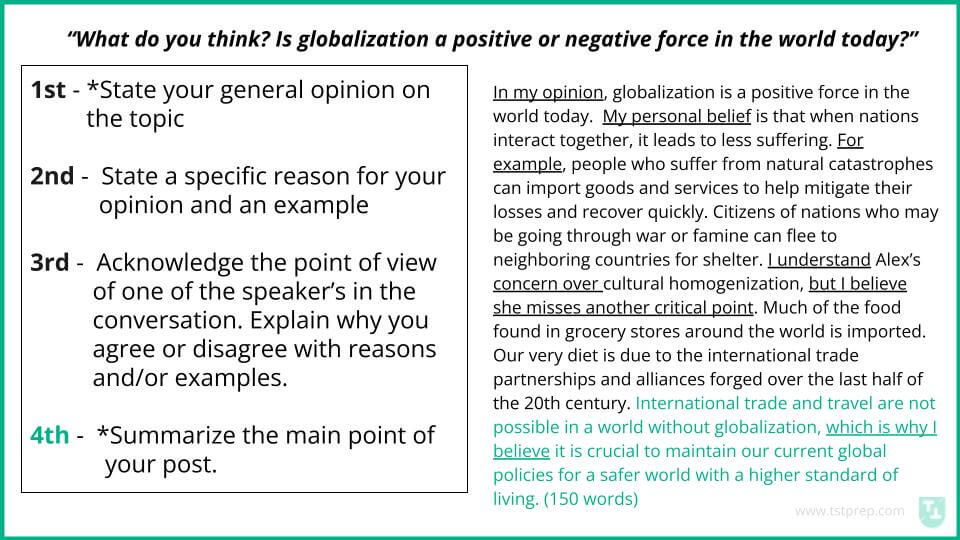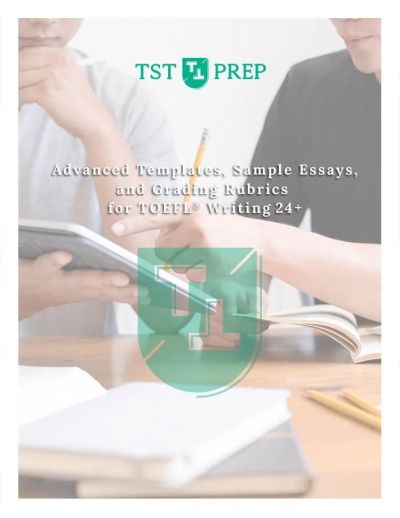

Sample Essays for the Writing Section of the TOEFL® Test
Did you hear about the updated TOEFL iBT Writing section?
On July 26, 2023, ETS introduced a new TOEFL Writing question: Writing for an Academic Discussion.
That’s right. The Independent Writing question has been retired from the official TOEFL iBT test.
Before we get into the topics and sample essays for the new TOEFL Writing question, let’s start with the first task, which hasn’t changed, the Integrated Writing.
TOEFL Integrated Writing Topics
In the TOEFL Writing Section, there are two questions you must respond to. The first question is called the TOEFL Integrated Writing task. The second question is called the TOEFL Writing for an Academic Discussion task.
The integrated question presents a reading and listening passage, followed by a question, which is a bit more complicated.
Integrated Writing: Task Breakdown |
|
|---|---|
| Question Structure | Content |
| 1st | The writing section instructions will be read aloud. You can skip this introduction. |
| 2nd | You will be given an academic passage to read. This passage will contain between 250-300 words. When the clock starts, you will have three minutes to read the passage. After that, the passage disappears and an audio lecture starts. However, the reading passage will return when it's time to write. |
| 3rd | A lecture that addresses the content of the reading will start to play. The lecture will last for two to three minutes. |
| 4th | After the passage finishes, you will be asked a question. The question is almost always something like: "Summarize the points in the lecture, being sure to explain how they challenge specific points made in the reading" |
| 5th | The clock starts. You will have approximately 20 minutes to write an essay of at least 250 words. You must answer the question and report on the most important points from both the reading and listening. |
Simple, right?
No? Still confused.
No worries. The best way to understand something better is through examples.
Let’s do one together.
This TOEFL integrated writing topic deals with the use of Corn Ethanol.
Give yourself three minutes to read it:
The chemical compound, ethanol, has risen in recent years as the most viable alternative to fossil fuels. Ethanol is a renewable fuel made from crops, mainly from corn in the United States, which can power engines. There are many who argue that corn ethanol should replace fossil fuel gas as the primary source for running cars.
One major benefit of using corn ethanol is that it uses less energy than gasoline. Using less energy means that people can get better gas mileage while driving these more fuel-efficient cars. In the long-run, this will be cheaper for consumers because they can drive further than they do now with fossil-fueled cars. People will spend less money on gas because they won’t have to stop to fill up as frequently.
Another advantage of switching to corn ethanol is that it helps the American economy become less reliant on energy sources from other countries. Petroleum is not readily available in the U.S., so it must be imported from other countries. Depending on foreign relations with those countries, fuel becomes a political issue. Corn is a crop that America has in abundance. By using corn ethanol instead, the cost of gas will decrease because now the import taxes on fossil fuels are calculated into the price. This also means that we will be putting the money into our own economy, thus helping local corn farmers.
One of the most attractive aspects of corn ethanol is how environmentally friendly is when compared to current automobile gasoline. Fossil fuels release carbon that has been stored for years from the earth. Burning biofuels, like corn ethanol, is better for the environment because it releases less greenhouse gas emissions. Lessening the amount of carbon emissions will help prevent global warming and all of the other negative effects of climate change.
Once three minutes have ended, listen to a conversation about the same topic
Now, it’s time to write your TOEFL essay.
Stop reading.
Start writing.
Seriously.
Write your essay before you look at this TOEFL Writing sample. You will learn a lot more if you actually write the essay and then compare this to your own.
Here’s an expert TOEFL teacher’s sample essay to this particular TOEFL Writing topic.
The article introduces the topic of corn-based ethanol. More specifically, the writer discusses the advantages of switching from fossil fuels to this alternative energy source. The lecturer in the listening passage disagrees. He believes that the benefits the author mentions are misleading and attacks each of the claims made in the reading.
In the reading, the author begins by stating that drivers will get better gas mileage on corn ethanol than on fossil fuels, and therefore save money on gas. The speaker, however, disagrees. He states that the production of corn ethanol is very expensive. He says that in order to make for the costs to create and distribute this biofuel, the price of ethanol gas will increase. Therefore, it will not be any cheaper for consumers in the long run.
The writer also claims that making the switch to corn ethanol will help the American economy because it will make the United States less dependent on foreign oil. Again, the lecturer believes there are flaws in the writer’s argument. He holds instead that mass use of corn-based ethanol will hurt the economy. He elaborates this by point out that the inevitable competition for corn by multiple consumers, including beef and dairy farmers, will drive the price of corn up.
Another reason why the author feels that moving from traditional gasoline to corn ethanol is a good idea is that they are more environmentally friendly than fossil fuels. The professor in the listening passage is doubtful that this is accurate. He suggests that as more farmlands are created to support the demands for more corn, more carbon will be absorbed by the land. This means that these emissions will still be released to negatively affect the environment.
As you can see the author and speaker hold very different views about the use of corn ethanol.
The author here clearly defined the main idea, organized the supporting points from both the reading and listening passage, and showed how they differ from each other.
I know it may seem a bit difficult, which is why I recommend that you start off with a TOEFL Writing template for both the Writing for an Academic Discussion task and Integrated essay.
Looking for more example essays?
Download our TOEFL Writing 24+ Guide if you would like more sample essays. It includes extra tips, tricks, and strategies you will not find anywhere else. Download it for free
Too complicated? Don’t worry.
I will share TOEFL writing templates for the Integrated Writing question, which will make your life a whole lot easier.
But first…
We have to talk about the Writing for an Academic Discussion question.
Writing for an Academic Discussion Question
You will have 10 minutes to complete the Writing for an Academic Discussion question.
For this task, you will participate in an online discussion. After you read the question and student responses, you will have to write a response that adds to the conversation.
Here’s the breakdown:
Writing for an Academic Discussion |
|
|---|---|
| 0-2 minutes | Scan the discussion and plan |
| 2-9 minutes | Write your response |
| 9-10 minutes | Edit your response |
This question is straightforward, but let’s do a sample together.
When the question appears on the screen, take two minutes to scan the passage and the student’s opinions.

Start to write your response. Be sure to add to the discussion and avoid repeating the same points as the other students.
Aim to write at least 120 words.

Get peace of mind with these TOEFL Writing Templates
Now that you have a few TOEFL Writing topics and sample essays to study from, you may want to use a writing template to help guide your writing.
A TOEFL template is basically a pre-organized set of words and phrases that you can use in almost any TOEFL Writing response.
Here’s TST Prep’s template for the integrated TOEFL Writing question (question one):
And here’s our template for the independent TOEFL Writing for an Academic Discussion (question two):
The article introduces the topic of (general topic). More specifically, the writer discusses (stance of the author on the topic). The lecturer in the listening passage disagrees. He believes that (stance of the professor on the topic) and attacks each of the claims made in the reading.
In the reading, the author begins by stating that (first point made to support stance). The lecturer, however, disagrees. He states that (first counterargument by the professor). He goes on to say that (additional detail about first counterargument).
The author also claims that (second point made to support stance). Again, the lecturer believes there are flaws in the writer’s argument. The speaker holds that (two sentences about the professor’s second counter-argument).
Another reason why the author feels that (restate stance of author) is that (third point made to support stance). The professor in the listening passage is doubtful that this is accurate. He suggests that (two sentences about the professor’s third counter argument).
To sum up, both the writer and professor hold conflicting views about (general topic). It’s clear that they will have trouble finding common ground on this issue.
BASIC TEMPLATE: QUESTION 2 (Writing for an Academic Discussion) |
||
|---|---|---|
| Structure | Template | Example |
| State your general opinion on the topic | In my opinion, (general opinion of the topic) | In my opinion, globalization is a positive force in the world today. |
| State a specific reason for your opinion and an example | My personal belief is that (specific reason). For example, | My personal belief is that when nations interact together, it leads to less suffering. For example, people who suffer from natural catastrophes can import goods and services to help mitigate their losses and recover quickly. Citizens of nations who may be going through war or famine can flee to neighboring countries for shelter. |
| Acknowledge the point of view of one of the speakers in the conversation. Explain why you agree or disagree with reasons and/or examples. | I understand _____ concern over ____, but I believe he misses another critical point. I totally agree with _____ point about ____, and I would like to add _______. | I understand Alex's concern over cultural homogenization, but I believe he misses another critical point. Much of the food found in grocery stores around the world is imported. Our very diet is due to the international trade partnerships and alliances forged over the last half of the 20th century. |
| Summarize the main point of your post. | (restated reason) ____, which is why I believe ___ (restated main point) | International trade and travel are not possible in a world without globalization, which is why I believe it is crucial to maintain our current global policies for a safer world with a higher standard of living. |
You will notice that the sample essays in this article differ from the templates.
You do not have to use templates, it’s up to you. Some people prefer to write in their own unique fashion for the entire exam. However, you will notice that the structure of the templates is similar to the TOEFL example essays.
These templates follow the exact organization and structure you are expected to use on test day, so don’t hesitate to use them in your writing.
Also, don’t forget to download the free 24+ TOEFL Writing Guide if you would like more example essays, templates, and exclusive tips to help you earn the best possible TOEFL Writing score on test day.
If you read this far, it means you are serious about your TOEFL studies. Don’t hesitate to send us an email and let us know how we can help you earn the TOEFL score of your dreams – contact@tstprep.com
Did we forget anything? Please comment and let us know how we can improve our TOEFL Writing advice (or if you want to just say hi that would be great too).
Also read:
Create a FREE
Practice Account
Join now and start learning with our free materials








113 Comments
Comments navigation
Sam
There is something wrong with some samples. In the introduction, the writer must state the reasons not merely saying” there are two reasons and I will discuss what they are.” what’s more, I registered that the alternative is not covered. To make the long story short, I can say such samples are not good in terms of TR. I am saying all of these comments as a Cambridge examiner.
Josh
Hi there Sam and thank you for your feedback. We always appreciate insight from others. You may indeed be right since we are not actual TOEFL graders (and if we were it would be illegal to divulge information about specific scoring criteria), however, there has been much debate in the TOEFL world in terms of whether or not you should be specific in your introduction, in other words, state the specific reasons for your opinion. Both ways are fine, but they are not necessary because you are going to repeat those reasons later in your essay and to avoid repetitive lexical and grammatical forms, we often tell students not to focus much on the introduction. There are other colleagues in the field, like Michael Goodine from TOEFL Resources for example, who have years of experience helping thousands of students who score just fine with a sparse and vague introduction, the Cambridge exams might be different.
I do think you bring up a good point about What’s more and will edit this out in the future and to make a long story short phrasing as well. Thanks!
Dominic Barthlott
Hello, is there a blog post about your writing templates, or are they just accessible through your YouTube videos?
Are there any other PDFs that are only posted on YouTube videos and not in blog posts?
Josh
Hi Dominic, and thank you for getting in touch. We actually don’t have a blog post about writing templates (even though we should). I believe this PDF will have all of the information you are looking for – https://drive.google.com/file/d/1j-fGt9rvjklnU4v-ENUA2cE6d1fp2mt1/view?usp=sharing – Hope that helps!
Sherwyn
Hey Josh,
Thank you for providing such valuable information. I giving my Test Tomorrow and was confused about the Independent writing section. You had mentioned to stick to one side of an argument. However on the TOEFL official guide the person which got a higher score had mentioned both sides of the argument. Could you please clarify on this. Thank you in advance
Josh
Hi Sherwyn, and thank you for your question. There are a lot of different ways to score well in the TOEFL Speaking and Writing section. I usually recommend sticking to one side of an argument because it is easier to organize and structure. Often, students get lost and fail to focus on the question when they think about multiple viewpoints of an argument, which is why I recommend sticking to one side. However, if you feel comfortable showing both sides of an argument, go for it. Good luck tomorrow, and make sure to let me know how it went.
Sherwyn
Thank you very much for your reply and wishes. I’ll make sure to stick to only one side of an argument
Sherwyn
Hey Josh,
Thank you for your kind wishes. The Test went well. I got 4 reading passages. So the test went longer than usual. Also, in the writing section I got the good idea Topic. I was able to give examples. Thank you once again for all the resources which you have provided. Keep going. We all need you
Christian Daniel Benitez
This is awesome !! Thanks Josh
Josh
Thank you, Christian! I appreciate it 🙂
Pradyumn
Thank you very much, Josh! For everything about the TOEFL!
I have the exam tomorrow and I am using every template of yours!
I am very confident about the exam and you would be the reason for the confidence
Thank you very much again!
Josh
Good luck Pradyumn and let me know how it goes.
Comments navigation